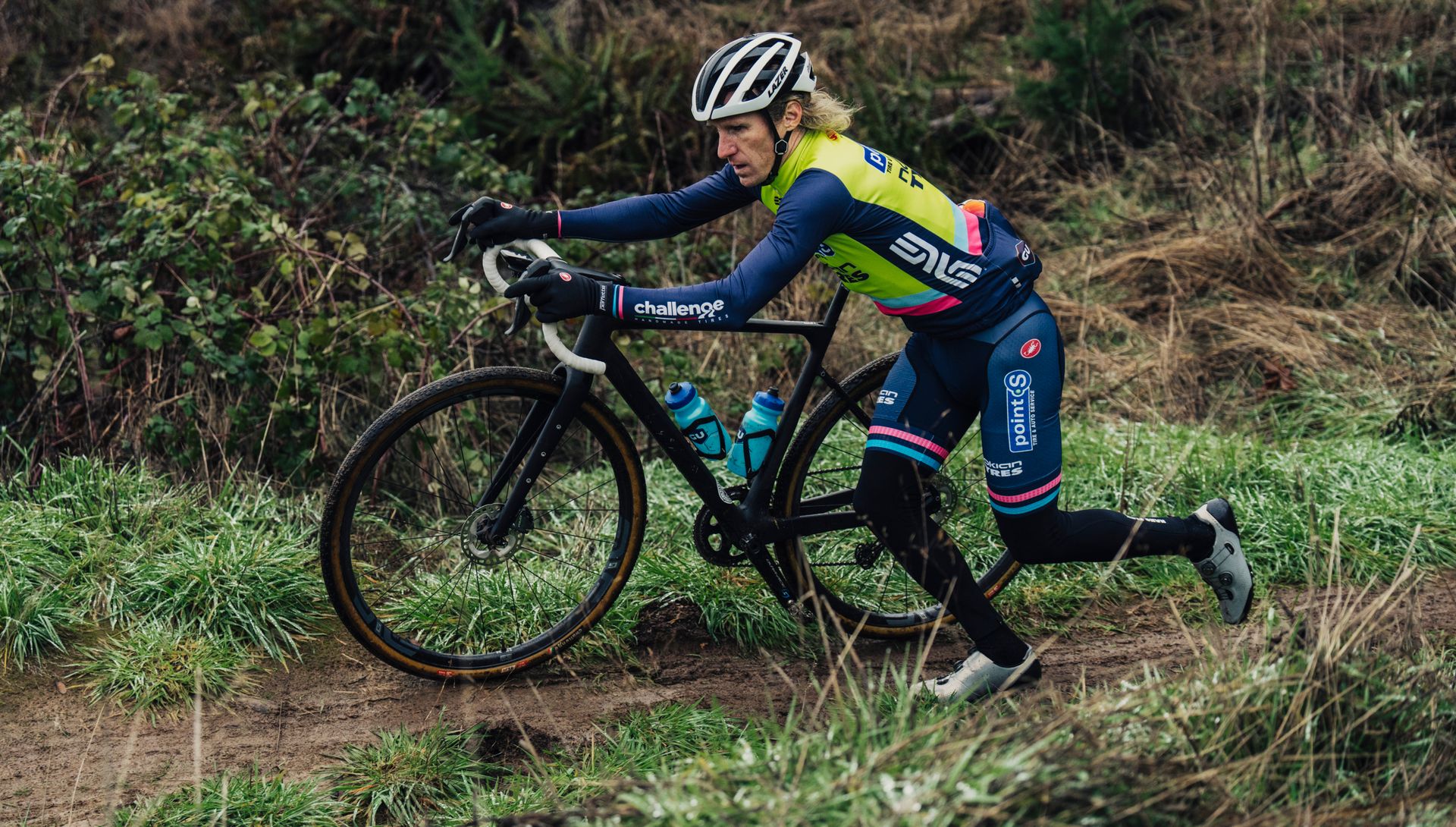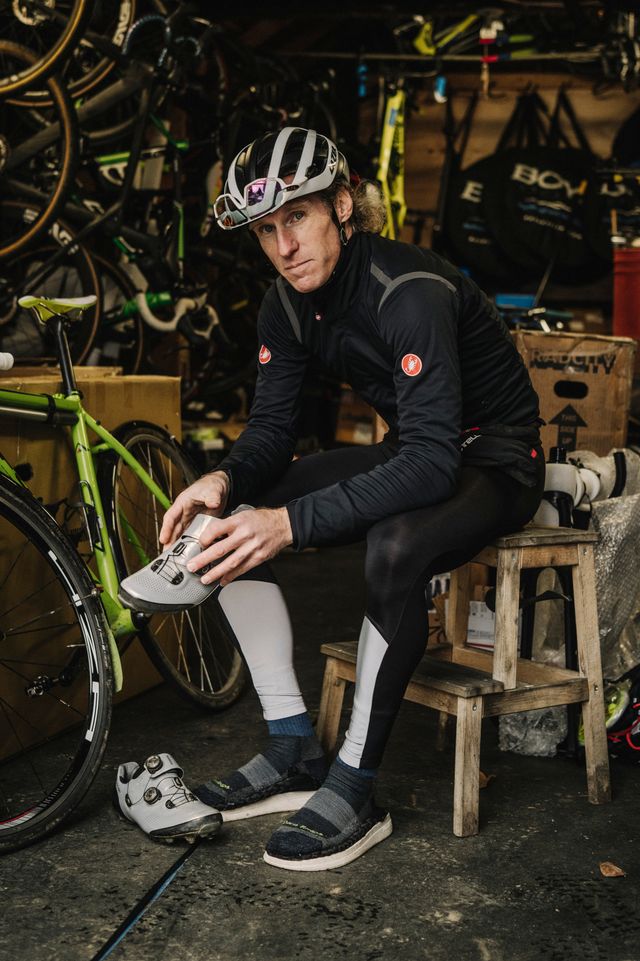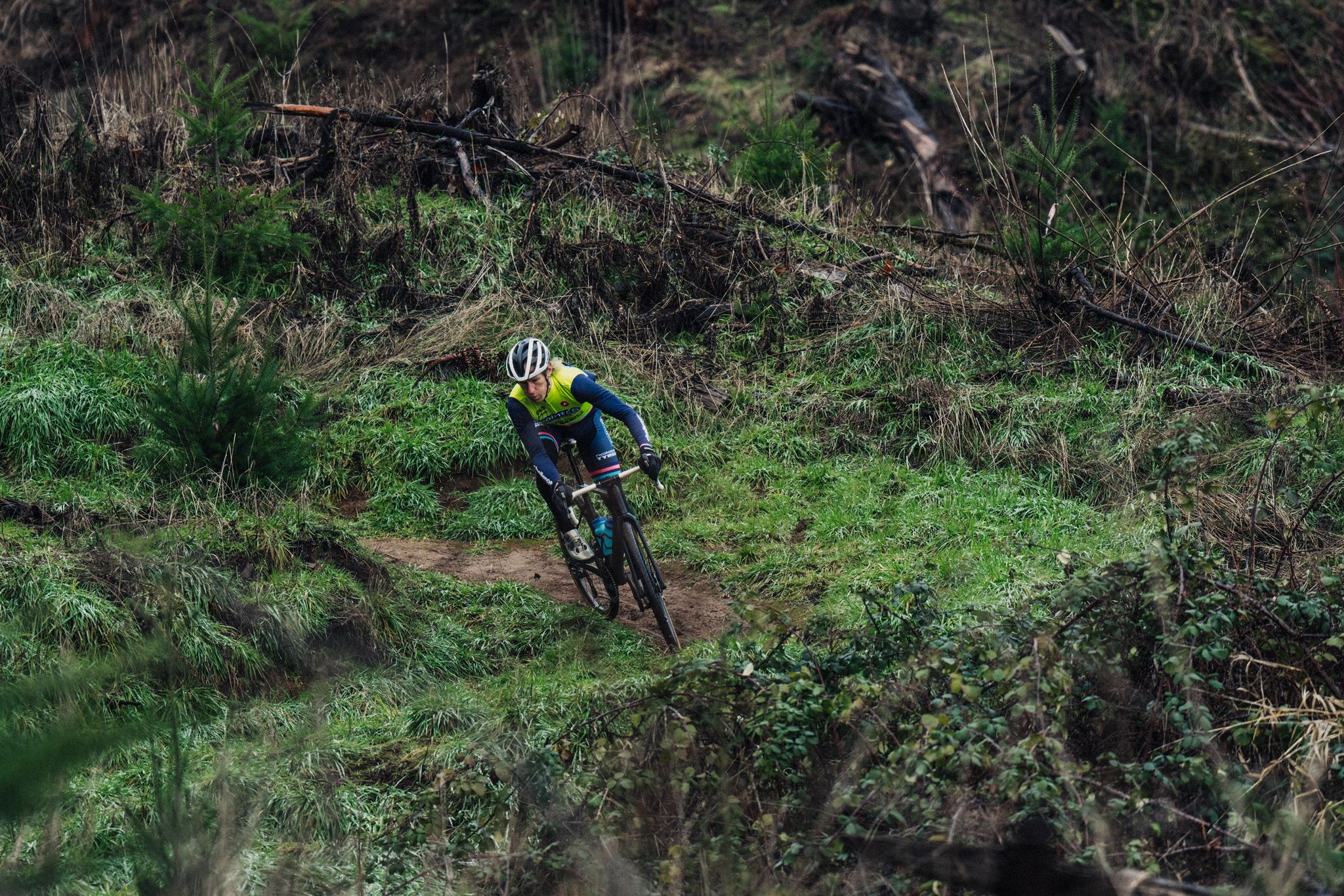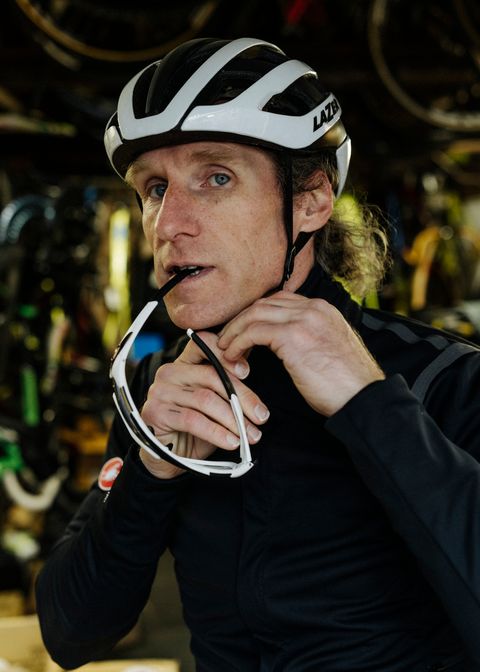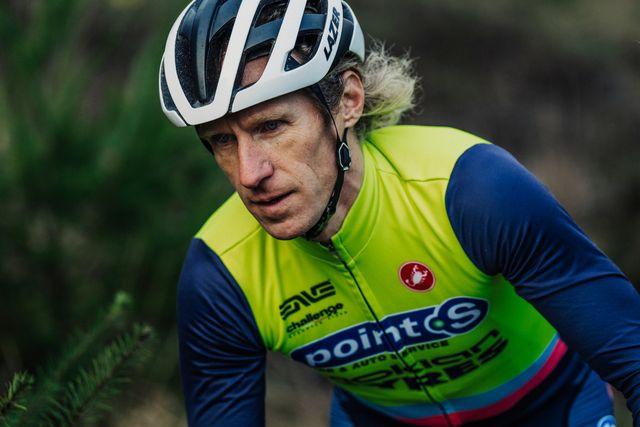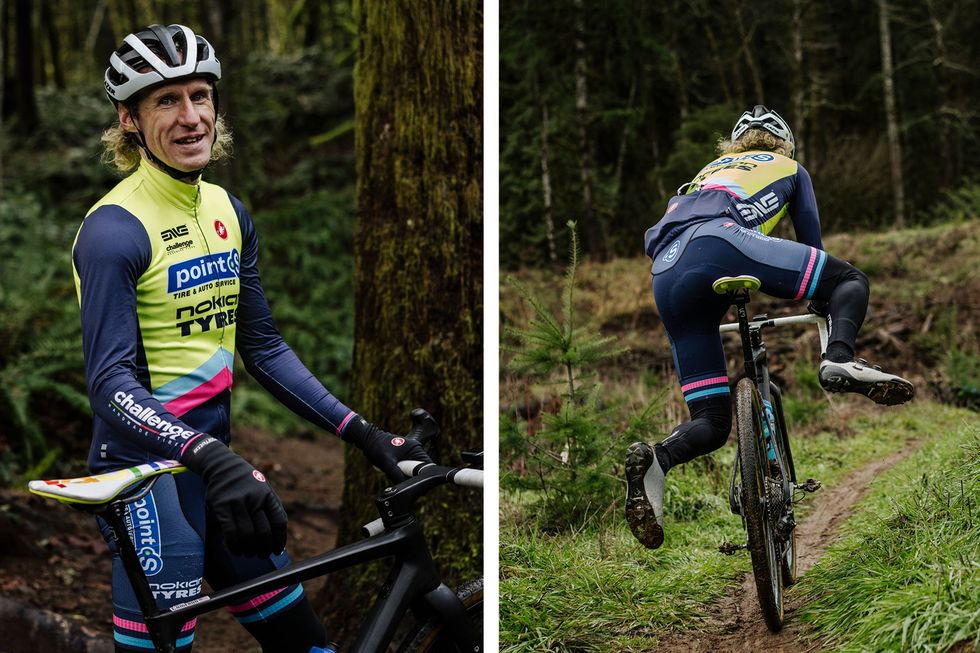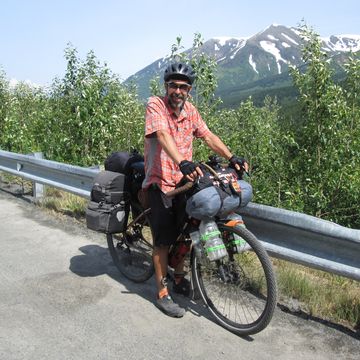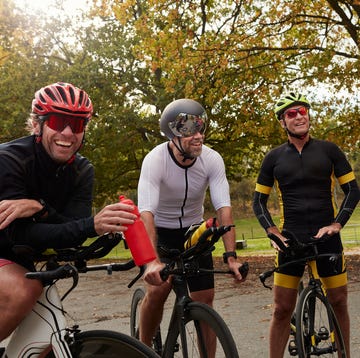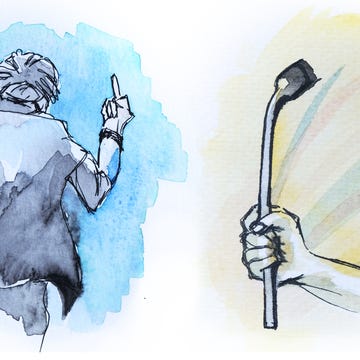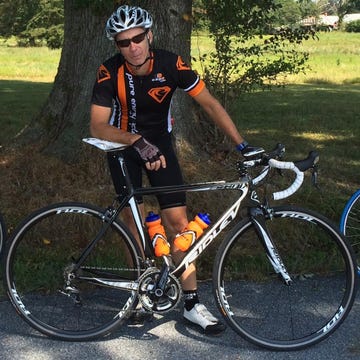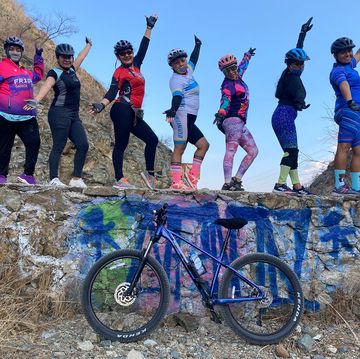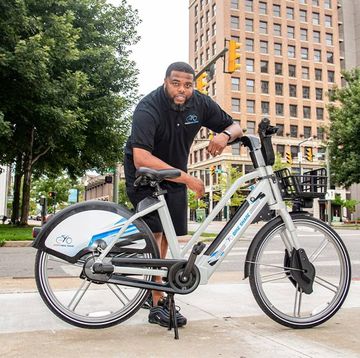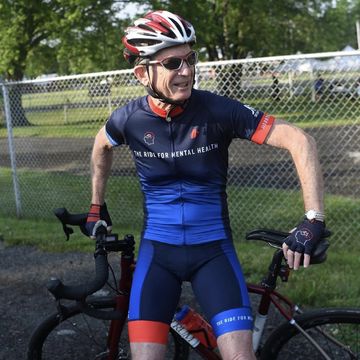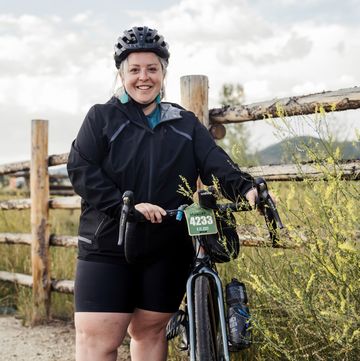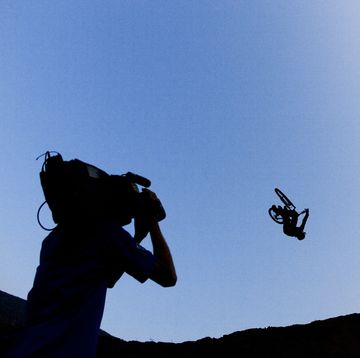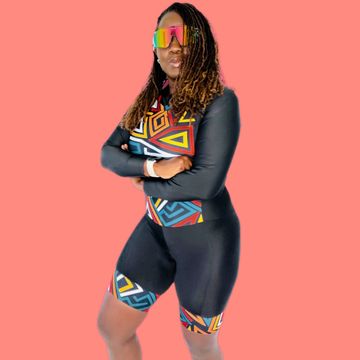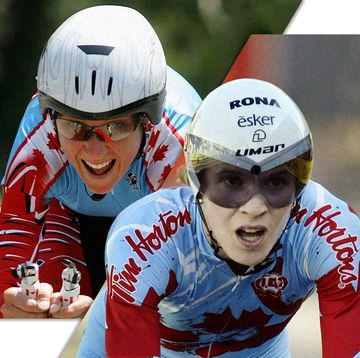Molly Cameron can’t remember how long she’s been racing bikes. Since the late 1990s, for sure—maybe 1998, or perhaps 1999. She doesn’t spend too much time trying to pinpoint a moment in the past. She’s too busy working on the future.
Few people in the bike world can remember a time when Cameron wasn’t present in the racing community. When folks talk about her, they all say a version of the same thing: “Molly has always just been Molly”; “Molly has just always been around.”
In fact, the 45-year-old has been involved in cycling for more than two decades, on the racing scene and as the longtime owner of a bike shop in Portland, Oregon. Everyone knew that Cameron’s situation was different, but it never really registered much because, again, Molly was just Molly.
And while the sport and the industry have been her life and her livelihood, they have also, in many ways, failed her. She’s been an openly transgender athlete since a time when people in sports knew even less about what to do with trans athletes than they do today. But she put her head down, rode her bike, and pretended she wasn’t bothered by the roadblocks that were thrown in her way.
Join Bicycling for unlimited access to best-in-class storytelling, exhaustive gear reviews, and expert training advice that will make you a better cyclist.
“I never led with my identity or my politics,” Cameron says. “I was just, like, ‘I’m here to ride my bike and try to ride my bike as fast I can.’ Everything else came second. I never hid it. I’m an openly transgender athlete, but I’ve never wanted to push.”
But now, as the spotlight on trans athletes intensifies in venues across the country—from local school districts to state legislatures to the Olympics—cycling is at a crossroads that threatens its potential to hold races and events that focus on the sport. Those in power can no longer ignore the conversation about how to better support trans athletes.
And so, as Cameron’s racing career winds down, her profile has exploded onto a national stage. After flying mostly under the radar for the past 20 years, she has suddenly found herself at the forefront of a high-stakes advocacy effort she never signed up for.
Getting a story out of Cameron is difficult, but not because she doesn’t want to talk to you. She has so much to say that she tends to go in what feels like a million directions at once, not always coming back to the original thread. She speaks with an edge, seemingly unconcerned about polish, her remarks heavily laced with profanity for emphasis—remnants of her days in the 1990s San Francisco punk scene. She has done so much in her lifetime and is always going so quickly that details like years and ages escape her, so she does her best to estimate.
Cameron, whose father was in the Air Force, was born in Wichita Falls, Texas. Her parents were still teenagers at the time, and she spent her childhood moving between Texas and Belgium and Turkey. Her parents split up when she was 11 or 12 years old, and Cameron and her mom moved to Delaware, where she attended high school. She dropped out in her junior year and moved west to California, first to Santa Cruz before landing in San Francisco. She lived there in the ’90s as part of the riot grrrl scene and began to care deeply about environmental activism, which helps explain how she ended up on two wheels. She worked as a bike messenger and eventually began racing bikes.
Around 1999, when she was in her early 20s, Cameron began HRT, feminizing hormone replacement therapy. A couple of years later, she wanted to get out of San Francisco for a while, so she swapped apartments with a friend who lived in Portland, Oregon. But she had a hard time finding work. “I couldn’t get a job in Portland anywhere. I couldn’t get a bike messenger job, even though I was well qualified. I couldn’t get a job at any bike shop,” she says. “I literally had men look at my résumé, look at my name, look at me, laugh, and walk away.”
She started fixing bikes out of her house, and in 2008 she opened the brick-and-mortar store that would eventually become Portland Bicycle Studio, a community hub and welcoming place focused on inclusion. She did it with virtually no money and ran the entire thing herself, becoming a fixture in the Portland bike scene, as much for her shop as for her racing. She eventually closed the shop in 2017.
“Molly just hustles and is always making something out of nothing and creating needed things where they didn’t exist previously,” says Adam Myerson, who coached Cameron from 2008 to 2010.
Shortly after she’d arrived in Portland, Cameron signed up to race ’cross in the women’s division. It was the early aughts, and few were talking or thinking about trans people the way they are now. She faced some harassment and some heckling, but mostly people accepted her or, if they didn’t, left her alone.
Until she started to have real success.
“It wasn’t like I was out there winning everything in the women’s field,” she told Ian Boswell on the Breakfast with Boz podcast in 2021. “I wasn’t even on the podium all the time… It’s bike racing, you lose races most of the time.”
But to Cameron, it felt like as soon as she won one race, everything changed.
It was a stage race called Columbia Plateau. As she told Boswell, she was a Cat 3, barely hanging on with a field of Pro 1 and 2 women, who were dropping her on the climbs. But it was a long stage, so the women ahead of her waited because they wanted to regroup.
“They were like, ‘Look, we know our riding is better than you… but we want help on the flat because we’ve got like 50 more miles to go,’” she recalled. But Cameron held on for longer than they expected. And when it came to the finish, a short sprint up a small hill, Cameron crossed the line first—little kicker sprints have always been among her strengths. “They should have dropped me and left me for dead 10 miles in, but they made a mistake and I capitalized,” she said of her win. “I won completely just on being a savvy bike racer.”
During her next race, she faced some of the worst transphobic heckling she’d ever encountered. This is a pattern when it comes to trans athletes, who are generally not questioned until they become a threat to the success of cis athletes.
In the meantime, Cameron’s win at the Columbia Plateau coincided with the 2003 ruling by the International Olympic Committee known as the Stockholm Consensus, which required full genital reassignment surgery for transgender women if they wanted to compete against cis women. Eventually, many national governing bodies—including USA Cycling—adopted the policy.
Cameron had been on HRT for several years at that point, but as the owner of a small business she had limited funds and couldn’t afford surgery even if she wanted it. She says she was at a race when a representative from the Oregon Bike Racing Association let her know that unless she had a doctor’s note saying she “had a vagina,” she couldn’t race. “It was that simple,” Cameron said on the podcast. “It was pretty heartbreaking, and I quit. I stepped back from racing.”
That IOC policy changed in 2015, removing the bottom surgery mandate but keeping a requirement for feminizing hormones and a testosterone level under 10 nmol/L (nanomoles per liter). Then, this past November, the IOC announced a new trans inclusion framework: It now recommends moving away from testosterone-centered policies. It also acknowledges the harm done to trans athletes by previous IOC policies. Athletes like Cameron had been failed by systems that were unconcerned with meeting their needs or ensuring a fair or inclusive way for them to participate in elite sport.
Eventually Cameron missed racing, so she started trying singlespeed and track racing and looking for mixed-gender races. After a while, she decided to get back on the road the only way she could—by competing against men. By that point, Cameron was no longer taking hormones altogether after losing her health care access, which had been tenuous to begin with.
“It was hard as hell,” she told the Breakfast with Boz podcast, of having to stop HRT and race with the men. “There were definitely times when I experienced being suicidal and being really depressed. I can still tap into the emotions in that feeling. It wasn’t that bike racing was life or death. It was my identity and who I was, that was life and death.”
Cameron’s experience sits at the intersection of so many of the struggles faced by trans folks. Restrictive policies seek to push them out of the sports they love; gender-affirming health care can be difficult or impossible for them to access; and they need to muster the persistence to find a way despite the hurdles.
Cameron has made choices, often at the expense of her own identity, that other athletes may not have made for themselves. As a result, anti-trans activists have tried to point to her as an example of what all trans athletes should do if they want to compete.
“But then she just rose through the ranks in the men’s fields while still identifying as a woman,” says Myerson. “And people were comfortable with that, because—I think this is sometimes the corner that Molly inadvertently gets painted into—the transphobes point to her as how you should do it.”
Of course, even staying in the men’s field wasn’t without complications. In 2015, despite a stellar season where she had 14 top-five finishes in the men’s 40+ category, she hit another roadblock: She was told she would be unable to compete in the men’s event at the Cyclocross National Championships, thanks to a rule that stated that women could not enter men’s events in national championships. First she was forced to race against men; then she was told she had to race against women. It seemed the goalposts were always moving.
“It was a little bit like the Wild West at the time,” Myerson says. “She didn’t have a path to follow, and neither did cycling.”
Even then, Cameron tried to give everyone the benefit of the doubt. “Put away the pitchforks and torches, USA Cycling is not always right but they are trying,” she wrote on Facebook at the time. “They are not the enemy.”
In 2019, the UCI, cycling’s world governing body, announced that the 2022 Cyclocross World Championships would be held in Fayetteville, Arkansas. But as preparations for the race were ramping up in March 2021, Arkansas governor Asa Hutchinson signed a bill banning trans participation in sports. The pushback from trans athletes and allies was immediate. Advocates called for a boycott of race sponsor Walmart and for the UCI to pull the event from the state to protest the legislation.
An Arkansas-based advocacy group, inTRANSitive, released an open letter calling for major entities to boycott hosting events in the state, including Worlds. “The people attacking us are funded by corporations and their money talks,” the letter noted. “But collectively we can talk over them.”
In response, USA Cycling released a statement condemning the legislation, as did the UCI. Race organizer Brook Watts released his own statement condemning the anti-trans legislation and encouraging people to donate to the Fayetteville Trans Equality Network in lieu of an outright boycott.
Cameron fielded a lot of questions about what she thought people should do and whether she supported the boycott. But her biggest concern, she says, was what the trans community in Arkansas thought should be done. The fact that this was happening in Arkansas hit home for her. The state holds a special place in her heart—it’s where her father was born and where her grandparents lived.
Faced with news of the legislation and thoughts of trans people in the state who may need support, Cameron did the only thing could think to do: She flew to Arkansas.
“I literally just tried to go down there and get with as many transgender folks as possible,” she says. “And none of them wanted to boycott. But they did want to use all this attention to create something for the community.”
That idea, Cameron says, of centering the trans community and creating spaces for them—and not just protesting or boycotting the people attacking them—“has colored everything I’ve been doing this year.”
The timing coincided with an inflection point in Cameron’s life: She had spent the previous 20 years as an elite athlete and racer, and she was now looking to the future—toward where her life and career might take her once she wasn’t racing competitively anymore. When she came back from Arkansas, she found herself moved to get involved and make a difference. But she wasn’t sure how. She considered volunteering for larger organizations devoted to LGBTQ+ advocacy, such as the Trevor Project or Athlete Ally. “And I was like, ‘You know what? There’s not a unified organization advocating for the LGBTQ+ experience in the cycling industry.’”
So when the anti-trans sports bills started sweeping the nation in 2021, she decided it was time to create her own organization. “I didn’t start [it] as a nonprofit organization in response to all these laws,” she says. “I started it in response to the complete inaction by our sport’s governing bodies, and by the bike industry at large.”
The goal of RIDE (Riders Inspiring Diversity and Equality) is to forge a meaningful connection between the cycling industry and LGBTQ+ communities that will lead to sustainable solutions for safety and inclusion.
“I am doing this work so those who come after me can simply be themselves without facing the discrimination I dealt with over three decades in sport,” she says on the RIDE website. “Let me take the heat now so that others don’t have to.”
Cameron has spent her entire career not wanting to be anyone but herself, making concessions that she felt were necessary and not being prescriptive about decisions that anyone else should make. She has always resisted simple narratives, has always resisted becoming part of someone else’s narrative, and she won’t let anti-trans activists use her situation to harm other members of her community. On that she is clear.
And as sports grapples with attempts to bar trans athletes—and trans women in particular—from competing, Cameron is in a complicated position: She has both the visibility and the lived experience to be a powerful advocate, but no real institutional power to make changes. Her hope now is that she can use her megaphone to get through to those people who do have the ability to change the industry—the equipment companies, the race promoters, and, most notably, the people inside USAC.
Her first major opportunity came at the USA Cycling National Cyclocross Championships in DuPage County, Illinois, in December 2021, when anti-trans protesters showed up at the race holding signs and harassing riders.
Cameron was there in her role as a Diversity and Inclusion consultant for Shimano, a sponsor of the event. While she was the elite women’s race taking photos—a passion of hers—someone asked if she had seen the protesters, who were standing in the middle of the race, in front of the TV cameras, with their signs. Cameron texted photos of the protesters to USAC staff and board members and asked if they planned to do something about it. She was assured that they were handling the situation, but the protesters were not asked to leave by USA Cycling. The organization claimed that by the time they heard back from their legal counsel about what their options were, the race was over.
Later, press coverage of the event was dominated not by the results or by the impressive showing put on by the athletes, but by those anti-trans protesters. “I hate naming these people because when you name them, you give them more power and more attention,” Cameron says. “USA Cycling is not going to want to call this a hate group, right? Because you don’t want to ever acknowledge that you had a hate group at one of your national championship events. It doesn’t look good.”
Cameron thinks it was an irresponsible oversight for the organization to not have a contingency plan in place ahead of time, since this same group had shown up at every other sanctioned bike race that year, she says, and there was plenty of warning that the protesters would be at nationals, too.
But she understands that it will be difficult to get sports governing bodies to have the backs of the most marginalized riders, and that change and solidarity is going to have to come from within. “None of these governing bodies are going to be efficient social justice orgs,” she says. “Most of them aren’t even good at protecting their athletes from abuse,” she continues, citing examples like USA Gymnastics and the Larry Nassar sexual abuse scandal.
A few days after nationals, USA Cycling CEO Rob DeMartini announced that he was resigning, with Brendan Quirk to take his place. Some people speculated that DeMartini stepped down in part due to the incident at the Cross championships. Whether Quirk can shepherd USAC through the next phase of its future has yet to be seen, but he will have to address the issue of trans athletes and inclusion head-on. On June 16, the UCI announced a new, far more restrictive policy for trans women effective July 1, 2022.
Cameron has been a radical activist and protester for the better part of three decades, ever since she started doing street outreach and working with trans sex workers in San Francisco’s Tenderloin in the 1990s. It has made her realistic about the kind of change that is truly possible by working within systems. “I am not the type of person that thinks you can change an organization from the inside,” she says.
And yet she’s also threading a small needle: She wants to be honest about what needs to happen—full inclusion for trans cyclists—while also not alienating industry leadership. She gives the benefit of the doubt wherever she can, always assuming good intent, trying hard not to say the wrong thing about the wrong person lest she burn bridges to someone who could truly help her make a shift in cycling culture.
“You’re not going to fundamentally change a corporation,” she says. “It’s been proven time and time again. In systems and structures that are so deeply corrupt, it’s near impossible for one individual to affect real change, institutional change.” But maybe, she hopes, she can mitigate the harm.
And so Cameron pushes on. Because what the past year has taught her is that even if the cycling world only moves a little bit, she has found fulfillment and purpose in connecting with other trans and nonbinary riders.
“I see [Molly’s activism] as an inevitability,” says Myerson. “This was a calling. Nobody could have done it but Molly.”
“I still don’t want to push my politics and my beliefs down anybody’s throat,” Cameron says. “Even in this advocacy work I’m doing, we can agree to disagree. We can have a conversation—but if our ‘agree to disagree’ ends up with you not acknowledging my human rights or being abusive or hateful... Then that’s not a conversation.”
Still, Cameron is more hopeful than some others may be about the future of inclusion in sport. “It feels simplistic to say, but I feel like we’re not that far away from transgender folks being able to participate in any sport without having to be under the microscope or validate their identity or jump through a bunch of hurdles just to play.”
She thinks—hopes—that despite the recent challenges the sport has faced, that cycling could be on the forefront of these conversations.
“This is the most engaged I’ve ever seen cycling,” she says. “I’ve yet to find a brand, or a bike shop, or a team, or anybody that’s been like, ‘No, fuck this, we don’t want to do inclusion.’ Most of them want to be better. I think cycling is behind in so many ways, but also I think the future does look bright for real change within cycling.”
Any change that comes to this sport will undoubtedly come, in large part, due to Cameron—her perseverance and unwillingness to be pushed off the road, and her commitment to staying engaged and fighting for change even after her racing career is behind her. She has given so much love to a sport that has not always loved her back, and the world of bike racing is better because Molly Cameron is in it.
It would behoove that world to recognize it while there’s still a chance to learn from her. She’s ready to teach them.
More Great Reads from Bicycling
- Did Anyone Really Know the Bike Wanderer?
- After a Reckless Driver Hit a Group Ride Outside Las Vegas, Friends and Family Are Still Struggling to Heal
- What Coming Out Day Means to These Cyclists—And Why It Matters
- Their Son’s Heart Saved His Life. So He Rode 1,426 Miles to Meet Them.
- These Women Are Changing Who Gets to Ride—One Custom Bike Frame at a Time
Frankie de la Cretaz is an award-winning independent journalist whose work focuses on the intersection of sports and gender. They are the co-author of Hail Mary: The Rise and Fall of the National Women's Football League, and their work has been featured in the New York Times, The Atlantic, Sports Illustrated, and more.
